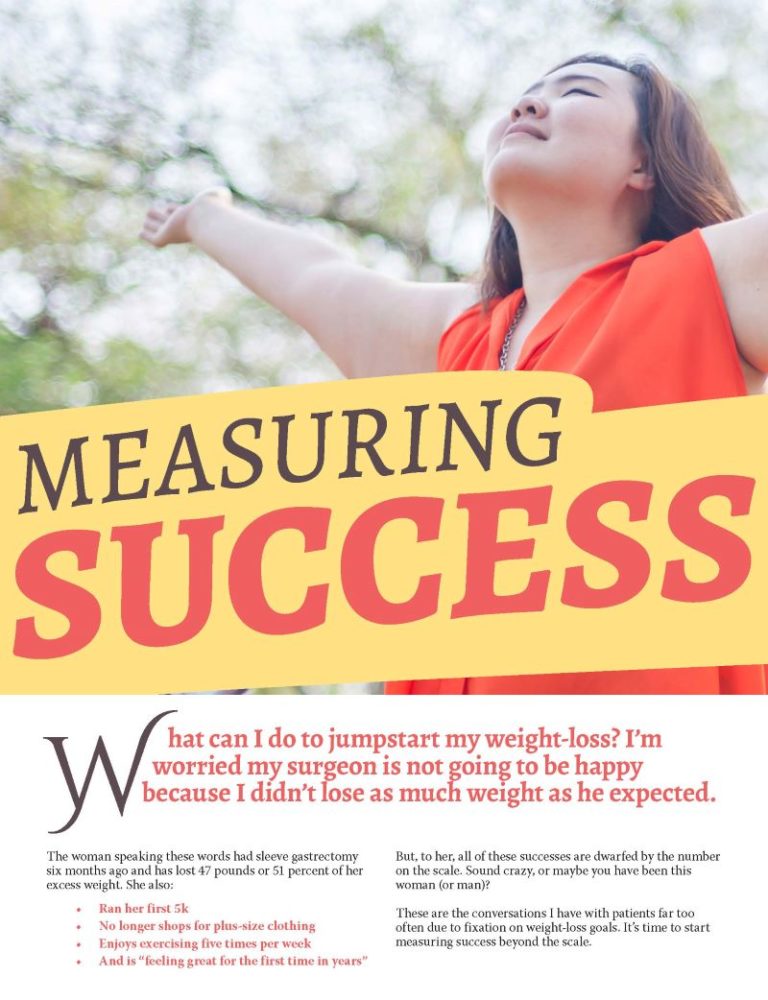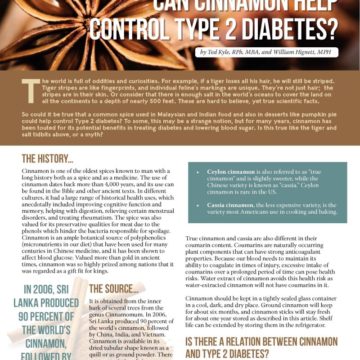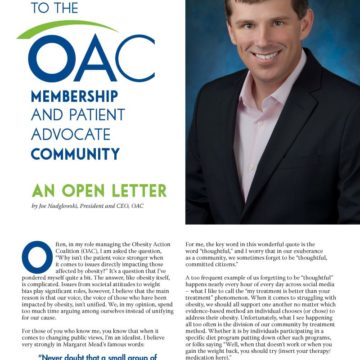Measuring Success beyond the Scale


by Laura Andromalos, MS, RD, LDN
Winter 2015
What can I do to jump-start my weight-loss? I’m worried my surgeon is not going to be happy because I didn’t lose as much weight as he expected.
The woman speaking these words had sleeve gastrectomy six months ago and has lost 47 pounds or 51 percent of her excess weight. She also:
- Ran her first 5k
- No longer shops for plus-size clothing
- Enjoys exercising five times per week
- And is “feeling great for the first time in years”
But, to her, all of these successes are dwarfed by the number on the scale. Sound crazy, or maybe you have been this woman (or man)?
These are the conversations I have with patients far too often due to fixation on weight-loss goals. It’s time to start measuring success beyond the scale.
Mistakes in Measuring Success
In a 2012 issue of the Harvard Business Review, Michael Mauboussin writes about a common mistake that many businesses make: using the wrong metrics to measure success. We make the same mistake in the healthcare world when we use weight as the only measure of success. After all, in the words of Dr. Arya Sharma, “Health is not measured in pounds.”
What’s Wrong with Weight?
As Mauboussin explains, the best metric for success will consistently be changed by the actions that you are taking. In other words, if weight is the best measure of success, it will change in a predictable way from your healthy actions.
The problem is that weight is not always predictable, and it doesn’t tell the whole story. You can lose weight in unhealthy ways or you can start healthy habits and not always see a change in weight. Plus, body factors, like muscle mass, bone structure, and water, affect weight.
Bottom line: The actions that make you healthier do not always lead to weight changes. This doesn’t mean weight is a bad metric. It just can’t be the only way by which you measure success.
Know Your Real Goal
To measure success, you need to know your real goal. I don’t think that “losing weight” is the real goal for many people. We often say that our goal is to “lose x number of pounds” because we closely tie weight to health, success and being accepted. Also, weight is easy to track.
But I think your real goal is probably about health, or energy levels, or confidence, or feeling comfortable. Your real goal is to have a better quality of life, in a physical, mental, and/or emotional way. That type of goal is not measured by weight alone. If you think of weight-loss as the goal and use weight to define success, you are missing the big picture.
How to Measure Success
We need to look beyond the scale to measure success. So where should we look? It will vary from person-to-person based on their goals, but I’d like to offer a few patient-inspired ideas.
Body Measurements
Sometimes you can lose body fat but not see a big change on the scale. Since muscle weighs more than fat, you might be maintaining or building lean muscle. If you are a numbers person, body measurements are a helpful number to track instead of just weight. Taking measurements of your waist, hips, arms, and legs when you start your health journey will give you a way to measure progress throughout time. Taking pictures will also help you to see the changes in your body.
Clothing Sizes
Even without taking body measurements, you can use clothing as a guide. Are you:
- Losing pant or dress sizes?
- Comfortably wearing clothes that had been pushed to the back of the closet?
- No longer browsing the plus-size section?
Then something in your body is changing! In the words of a patient, “I love not having to shop at the Big and Tall store anymore. My clothes are cheaper, I get more variety, and I feel normal.”
One note of caution: be careful that you don’t play the ‘numbers game’ with clothing sizes. Just like the number on the scale, the number on your clothing tag doesn’t define you.
Weight-Related Health Conditions and Medications
High blood pressure, high cholesterol, diabetes, and sleep apnea are just a few of the health conditions that are related to excess weight. Since starting your health journey:
- Have your blood pressure or cholesterol levels improved?
- Is your blood sugar easier to control?
- Are you taking smaller doses or fewer medications to help with these conditions?
- Maybe you ditched the CPAP?
As one of my patients told me, “Getting off insulin shots was the most important thing to me. I don’t miss those at all!” Fewer medications and fewer health conditions are amazing successes.
Feeling Comfortable in Public Settings
Having extra weight can cause uncomfortable situations in public settings. Maybe you’ve experienced this on public transportation, airplanes, or at the amusement park. I’ve heard my patients’ horror stories of being ‘stuck’ in too-small seats or being told in front of crowds that they are too large to ride the roller coaster with their children.
Did you walk into a room recently without looking for an armless chair? Did you enjoy every ride at the amusement park this past summer? Or maybe you can relate to my patient who can “fit into one bus seat and not feel like I am crushing the person next to me.” Feeling comfortable is so important for physical, mental, and emotional health.
Greater Mobility
Was your weight literally holding you back before? Maybe your joints and low back were achy from carrying excess weight or maybe you needed to use a walker or wheelchair. It is amazing to see a patient who first entered my office in a wheelchair come walking in on their own months later. It always delights me to hear, “I can cross my legs for the first time in years,” and “I can reach my own shoes.” Sometimes I hear new ones like, “I can climb aboard my boat from the water.” How are you celebrating your new mobility?
Greater Energy and Endurance
Are you bursting with energy since you started your health journey? My patients share amazing stories about their improved energy and endurance. Here are a few snippets:
- “I used to need sitting breaks in the shower. Now I take extra-long showers and I enjoy every minute of it standing.”
- “I remember the first time I came to see you, I had to take two breaks in the hallway and I was still huffing and puffing when I got here. Today, no breaks, and my husband can barely keep up with me.”
- “I used to dread our annual trips to Disney World with the kids because it was so exhausting. This year, I walked the whole park and still had energy at the end of each day.”
If these don’t count as successes, I don’t know what does!
Enjoying Being Active
Extra weight can make it hard to enjoy physical activity. Not only are you carrying extra weight, you might have had an unpleasant exercise situation, which makes it mentally hard to enjoy physical activity. It’s wonderful to hear from patients who are enjoying being active for the first time in years or maybe even ever. Walking, dancing, water exercises, yard work – Are you enjoying being active?
As one of my patients said, “I can measure my progress more in distance and pace when running and biking than I can from looking at the scale.” Another one told me, “I never thought I could enjoy exercise but now I love how I feel when I dance!”
Acknowledge Your Weight without Judgment or Praise
Hopefully this article has you thinking about the many ways to measure success with your health goals. I’m sure you are already adding to the list that I’ve started.
I’ll leave you with this one last story: At the end of each yoga class, my yoga teacher would say, “Acknowledge your practice without judgment or praise.” I didn’t get it. I knew that I shouldn’t judge my yoga practice, but why couldn’t I praise it?
After many weeks, I figured it out. When we judge and praise, we are saying that something is “bad” or “good” and that defeats the whole point of yoga. I think we can use this mindset for the scale too.
So next time you step on the scale, I challenge you to acknowledge your weight without judgment or praise. Take it for what it is: a number, one small piece of a big health puzzle, and certainly not the only measure of success.
About the Author:
Laura Andromalos, MS, RD, LDN, has been helping bariatric patients to achieve their health goals for more than five years. She currently works as the Bariatric Nutrition Coordinator at Brigham and Women’s Hospital in Boston. She received a BS in Nutritional Sciences from Cornell University, completed her dietetic internship at Mayo Clinic Florida, and received a MS in Health Communication from Boston University.
by Robyn Pashby, PhD Winter 2024 “No one is ever going to date you if you don’t…
Read Articleby Kendall Griffey, OAC Communications Coordinator Winter 2024 The Obesity Action Coalition’s 12th annual Your Weight Matters…
Read Articleby Nina Crowley, PhD, RD (with Inspiration from Shawn Cochran) Winter 2024 Dating, no matter your age,…
Read Article









